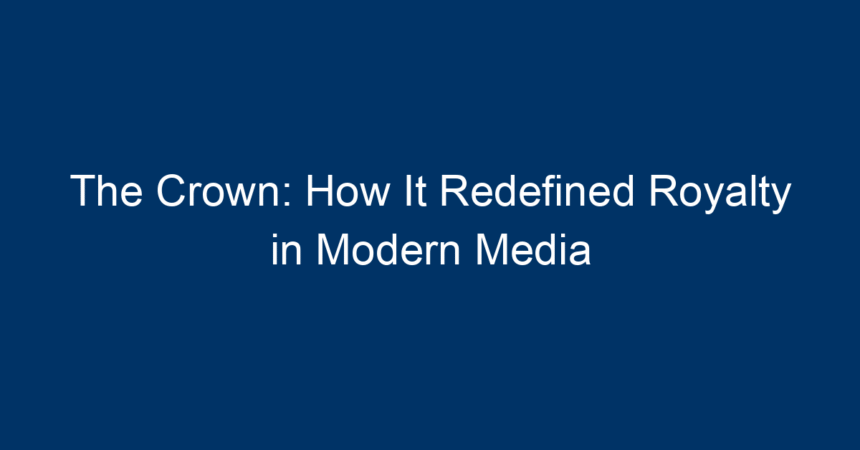In an age dominated by streaming services and binge-watching culture, few shows have managed to capture the collective imagination like The Crown. Netflix’s historical drama about the life and reign of Queen Elizabeth II not only redefined how we perceive royalty in modern media but also set new standards for storytelling, production quality, and character development. This article will explore the groundbreaking impact of The Crown on the portrayal of monarchy, its cultural significance, and what it means for the future of royal narratives.
A New Lens on Royalty
The Crown premiered on Netflix in November 2016, and it quickly garnered critical acclaim for its meticulous attention to detail and rich storytelling. The series, created by Peter Morgan, explores the personal and political challenges faced by Queen Elizabeth II and her contemporaries, depicting not just the glamorous facade of royal life but also the immense pressures and complexities that come with it.
Redefining Historical Drama
Before The Crown, royal narratives often leaned heavily on glorification. Shows like Downton Abbey and films such as The King’s Speech presented an idealized version of the British upper class, focusing predominantly on manners and etiquette. In contrast, The Crown digs deeper into the emotional turmoil, anxieties, and moral dilemmas faced by its characters, making the monarchy relatable to contemporary audiences. This new approach bridged the gap between historical fact and modern relevance, allowing viewers to draw parallels with their own lives.
Complex Characters and Human Narratives
One of the most striking features of The Crown is its character development. Each member of the royal family is fleshed out with their own ambitions, flaws, and fears. For example, Claire Foy’s portrayal of a young Queen Elizabeth breaks the mold of the stoic, omniscient ruler; instead, she emerges as a woman torn between duty and personal happiness. Similarly, other characters like Prince Philip and Princess Diana are portrayed with depth—showing their struggles, discontents, and the emotional weight of their roles.
Cinematic Excellence and Production Value
The production quality of The Crown is another pillar of its success. From the sumptuous costumes to the intricately designed sets, every detail is a testament to the craftsmanship involved in bringing the series to life. The creators invested heavily in high production values, including:
Outstanding Cinematography
The cinematography in The Crown captures not just the grandeur of royal life but also intimate moments, utilizing lighting and camera angles that evoke the emotional landscape of the characters. The show paints the royal residences in a way that feels both astonishingly beautiful and hauntingly isolating, showcasing the dichotomy of public versus private life.
Authentic Soundtrack
The score, composed by Hans Zimmer and recently by Martin Phipps, accentuates the emotional stakes of pivotal moments. The music in The Crown serves not just as a backdrop but as an emotional driver, enhancing the narrative’s impact. This attention to detail extends to sound design, which immerses the audience in both grand ceremonies and quiet familial interactions.
Cultural Impact and Public Perception
As The Crown delves into historical events—like the Aberfan disaster, the Suez Crisis, and Prince Charles’s tumultuous relationship with Princess Diana—it shapes public perception of historical monarchy. The show presents these events with nuance, encouraging viewers to reflect on their implications.
Influence on Public Discourse
The series has sparked discussions around the monarchy’s relevance in contemporary society. It raises critical questions: What does it mean to be a monarch today? How does royal family impact political landscapes? The Crown encourages audiences to reevaluate the role of monarchy, pushing for discussions that blend historical reflection and current opinion.
Reviving Interest in Royal History
The Crown has reignited interest in British royal history, encouraging viewers to explore books, documentaries, and articles related to the events depicted in the show. This newfound curiosity has created a ripple effect, leading to increased tourism and engagement in royal heritage sites.
The Role of Feminism in Depicting Royalty
The portrayal of Queen Elizabeth II is deeply intertwined with feminist discourse. While previous representations of queens often emphasized their roles as wives or mothers, The Crown illustrates her as a powerful figure who navigates a male-dominated institution with resilience and intelligence.
Modern Feminine Archetypes
Characters like Princess Diana and Margaret Thatcher, who both face societal and institutional challenges, also embody contemporary feminist themes. Their stories reflect broader issues of gender, power dynamics, and the struggle for agency within rigid structures. The women in The Crown defy stereotypes, showcasing not just their power but their vulnerabilities as well.
The Future of Royal Narratives
The Crown has undoubtedly set a new standard for how royalty is portrayed in media. As the series progresses through different historical periods, it emphasizes the continuous evolution of the monarchy and its adaptation to modern values and expectations.
Influence on Future Productions
The success of The Crown has paved the way for other projects exploring complex political and royal narratives. Networks and streaming services are likely to adopt similar approaches, understanding that audiences crave multi-dimensional characters and rich storytelling. We might soon see more series that tackle the complexities of leadership, legacy, and power.
Conclusion: Lessons from The Crown
In conclusion, The Crown has revolutionized the portrayal of royalty in modern media through its nuanced character development, high production value, and cultural relevance. It challenges viewers to engage critically with historical narratives while offering an immersive experience. As we look toward the future, we can draw several actionable insights from The Crown’s success:
-
Authenticity Matters: Modern audiences appreciate authentic narratives that reflect real-life complexities.
-
Invest in Production Quality: High production value can significantly enhance storytelling and audience engagement.
-
Embrace Complexity: Multi-dimensional characters resonate more with viewers, encouraging deeper connections with the narrative.
- Encourage Discussion: Media that sparks conversations about history and society holds the potential for cultural impact.
As we continue to celebrate and critique the monarchy, The Crown serves as a reminder that the stories we tell about royalty can offer profound insights into our humanity. Whether you’re a royalist or a skeptic, one thing is clear: The Crown has reshaped the landscape of royal narratives in modern media, leaving an indelible mark on how we perceive the past and present of monarchy.




